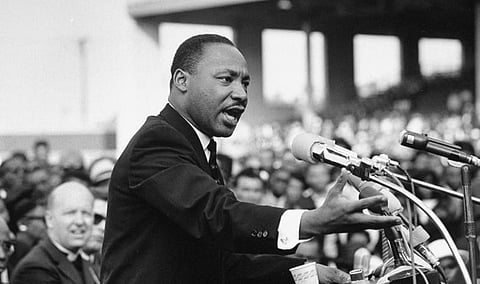The real meaning of Martin Luther King Jr’s Mountaintop speech
On the night before his assassination, the American civil rights leader spoke of economic justice — a call that remains relevant today

Fifty years ago this week, the Rev. Martin Luther King Jr. delivered one of the best known, yet mostly unheard speeches in American history — his “Mountaintop” speech. He spoke for more than 40 minutes, but only his concluding lines, about looking off into a promised land he might not reach, are widely remembered. For a time, only that passage, appearing to prophesize his death, could be found. But perceived in its original context, his speech is about much more than King’s life and fate. It was a call for economic justice in the United States, a call that remains relevant today.
By 1968, King had become someone very different from the man who gave the “I Have a Dream” speech at the March on Washington in 1963. He had begun talking about solutions to poverty and planning for a Poor People’s March on Washington. He was called to Memphis to support striking African-American sanitation workers making barely a dollar an hour and unable to get recognition for their union. They carried placards with the simple message “I Am a Man.”
Local organisers soon lost control of a march, which erupted into violence. The disturbance led to negative media coverage of both the strike and King’s planned march in Washington. On the stormy night of April 3, in front of a small crowd at Memphis’ cavernous Mason Temple, he spoke.
Years later, I was part of a team working on Eyes on the Prize, Harry Hampton’s civil rights series for PBS. To tell the story of the Memphis strike, we were lucky to find an archive of local news footage, thrown out by the stations and literally rescued from their trash cans by area activists. While there was audio of the entire Mountaintop speech, we were surprised that our initial search turned up just a few minutes of film, mostly the speech’s conclusion.
Over the next year, we found more footage, often snippets discovered in mislabelled or unidentified boxes. Ultimately, we included every bit of what we had found for an early rough-cut screening, knowing we’d have to cut it down for our final broadcast hour. Though we eventually used only about two minutes, not a single person at that screening suggested cutting a frame of King’s speech. It was that powerful.
Most Americans are familiar with the last 60 seconds of the speech, with its famous declarations “I’ve been to the mountaintop” and “I’ve seen the promised land.” But the full speech included a call for economic justice in language that portended the man he might have lived to become. King spoke of the arc of history and his happiness at being alive during a human rights revolution to stand up for workers in Memphis. Beyond non-violent protest, he urged boycotts against businesses that tolerated injustice, and he called those businesses out by name.
This is not the King of our national holiday, but the King who cited the findings of the newly released Kerner Commission report, angrily declaring that economic solutions were being ignored, that if a man didn’t have a job or an adequate income, that he had neither life, liberty nor any possibility of the pursuit of happiness. This King described his Poor People’s Movement as a call for radical redistribution of wealth and economic power in the country.
Jacqueline Shearer and I used this footage in making “The Promised Land”, the 10th episode of Eyes on the Prize — a film that is ultimately about loss. The day after his speech at the Mason Temple, King is assassinated. His Poor People’s Campaign came to Washington the following month and eventually failed, its tent city, mired in mud on the National Mall, literally ploughed under by the National Guard. Over that footage, we hear King one last time, as if from the grave, paraphrasing from the book of Matthew.
“One day, we will have to stand before the God of history. And we will talk in terms of things we’ve done. And its seems to me that I can hear the God of history saying, ‘That was not enough. For I was hungry, and you fed me not’.”
In our polarised society, economic and racial divisions remind us that our work as a nation is far from done. The real meaning of King’s Mountaintop speech is as relevant today as it was 50 years ago. If he were alive today, his exact words might differ, but the call for attention to our economic disparity could be the same.
— Washington Post
Paul Stekler, a documentary filmmaker, teaches at the University of Texas at Austin, US.
Sign up for the Daily Briefing
Get the latest news and updates straight to your inbox


